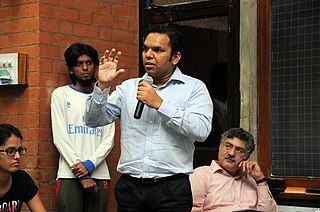
A hackathon is an event where people engage in rapid and collaborative engineering over a relatively short period of time such as 24 or 48 hours. They are often run using agile software development practices, such as sprint-like design wherein computer programmers and others involved in software development, including graphic designers, interface designers, product managers, project managers, domain experts, and others collaborate intensively on engineering projects, such as software engineering.

Genome Valley is an Indian high-technology business district spread across 2,000-acre (8.1 km2)/(3.1 sq mi) in Hyderabad, India. It is located across the suburbs, Turakapally, Shamirpet, Medchal, Uppal, Patancheru, Jeedimetla, Gachibowli and Keesara. The Genome Valley has developed as a cluster for Biomedical research, training and manufacturing. Genome Valley is now into its Phase III, which is about 11 km from the Phase I and II with the total area approximately 2,000-acre (8.1 km2).
The Industrial Technology Research Institute is a technology research and development institution in Taiwan.

A hackerspace is a community-operated, often "not for profit", workspace where people with common interests, such as computers, machining, technology, science, digital art, or electronic art, can meet, socialize, and collaborate. Hackerspaces are comparable to other community-operated spaces with similar aims and mechanisms such as Fab Lab, men's sheds, and commercial "for-profit" companies.

The Segal Design Institute is a design thinking institute at Northwestern University. Segal operates within the McCormick School of Engineering and Applied Science and is dedicated to the study of human-centered design at the undergraduate and graduate level.
Science for Society is a technology-based social enterprise that started in 2008 as an informal group of students from different backgrounds including engineering, medical, business and science. Science for Society was registered as an NGO in 2010; Vaibhav Tidke was the founder.
Hacking Health is a social organization that pairs innovators with healthcare experts to build solutions to front-line healthcare problems through the use of emerging technology.

Srijan Pal Singh is an Indian author, public speaker and social entrepreneur. He was born and raised in Lucknow, Uttar Pradesh.

The Microsoft Garage is a Microsoft program that encourages employees to work on projects about which they are passionate, despite having no relation to their primary function within the company. Employees from all divisions of Microsoft are free to take part in Microsoft Garage activities and small-scale innovation projects. The Microsoft Garage is a global program with locations on the main campus in Redmond, Washington, and several others spread all over the world, and a website that launched in October 2014 to share experimental projects with customers.
Design fiction is a design practice aiming at exploring and criticising possible futures by creating speculative, and often provocative, scenarios narrated through designed artifacts. It is a way to facilitate and foster debates, as explained by futurist Scott Smith: "... design fiction as a communication and social object creates interactions and dialogues around futures that were missing before. It helps make it real enough for people that you can have a meaningful conversation with".
ATMOS is the annual techno-management festival of BITS Pilani, Hyderabad Campus, located in Hyderabad, India. It is known for a wide range of events, such as workshops, quizzes, lectures, technical exhibitions and competitions. Among the notable events conducted annually during it are the national level quiz Enigma and BITS MUN Hyderabad. Started in 2012, ATMOS aims at improving the technical culture among Indian colleges as well as providing a platform to showcase their abilities. In its sixth year now, ATMOS is growing rapidly with participation from students, academicians, entrepreneurs and speakers from all over India.

Smart manufacturing is a broad category of manufacturing that employs computer-integrated manufacturing, high levels of adaptability and rapid design changes, digital information technology, and more flexible technical workforce training. Other goals sometimes include fast changes in production levels based on demand, optimization of the supply chain, efficient production and recyclability. In this concept, as smart factory has interoperable systems, multi-scale dynamic modelling and simulation, intelligent automation, strong cyber security, and networked sensors.
Kshama Metre, popularly known as Doctor Didi, is an Indian rural development leader, and a pediatrician, who has led the Chinmaya Organization for Rural Development (CORD) since the founding of its predecessor organization in 1985, and she leads the organization as its National Director. The organization serves the rural areas of India with its unique approach for sustainable and comprehensive community driven integrated development program, under the aegis of the Chinmaya Mission. While holding the directorship of CORD India, she also serves as an adviser to CORD USA, the US wing of the Organization. A recipient of several awards including the Guardian International Development Achievement Award of 2012, she was selected as the Woman of the Year by The Week magazine, in 1993. The Government of India awarded her the fourth highest civilian honor of the Padma Shri, in 2008, for her contributions to society.

Praj Industries Limited is an Indian multinational process and project engineering company, headquartered in Pune, Maharashtra. The company also has offices in South Africa, North America, Latin America, the Caribbean, Thailand and Philippines. Its manufacturing facilities are at 4 locations – in Sanaswadi, near Pune; Kandla, Port in Gujarat and Wada, Thane District. Praj is a recipient of the DSIR National Award in 2005 for outstanding In-House R&D Achievements.
Agile architecture means how enterprise architects, system architects and software architects apply architectural practice in agile software development. A number of commentators have identified a tension between traditional software architecture and agile methods along the axis of adaptation versus anticipation.
The National Security Innovation Network is a United States Department of Defense (DoD) program office under the Defense Innovation Unit that seeks to create new communities of innovators to solve national security problems. NSIN partners with national research universities and the venture community to reinvigorate civil-military technology collaboration. As opposed to making investments in specific technologies, government research and development programs, or startups, NSIN focuses on human capital innovation – i.e., developing and enabling innovators and human-centered networks to solve national security problems. In support of this mission, NSIN provides tools, training, and access to DoD assets that enable entrepreneurs and intrapreneurs to develop and commercialize high potential products in the national interest.
Threatcasting is a conceptual framework used to help multidisciplinary groups envision future scenarios. It is also a process that enables systematic planning against threats ten years in the future. Utilizing the threatcasting process, groups explore possible future threats and how to transform the future they desire into reality while avoiding undesired futures. Threatcasting is a continuous, multiple-step process with inputs from social science, technical research, cultural history, economics, trends, expert interviews, and science fiction storytelling. These inputs inform the exploration of potential visions of the future.

Solomon Darwin is an American professor of business and the director of the Garwood Center for Corporate Innovation and the executive director of the Center for Growth Markets at the Haas School of Business at the University of California, Berkeley. He is known as the visionary leader of the Smart Village Movement and for developing "smart village frameworks" for rural villages with the support of state and local governments in India and UC Berkeley. He published four books to support his thesis : "How to Create Smart Villages: Open Innovation Solutions for Emerging Markets", "How to Think like the CEO of the Planet", "The Untouchables" and "Smart Villages of Tomorrow: The Road to Mori" and is known as the Father of the Smart Village Movement.

BETIC based at Indian Institute of Technology Bombay is an inter-disciplinary multi-institution initiative for medical device innovation. Established in 2014 with support from the government of Maharashtra, it comprises a network of 14 engineering and medical institutes across the state. The BETIC team have developed 50 medical devices as of 2019, and licensed 20 of them to startup companies or industry for mass production.
Synd iNNOVATE 2019 was the National Level Hackathon conducted by Syndicate Bank in September 2019 to encourage Innovation in Banking Industry. It attracted more than 3,500 ideas from applicants from all over India out of which final 40 teams were called for Onsite Hackathon.









